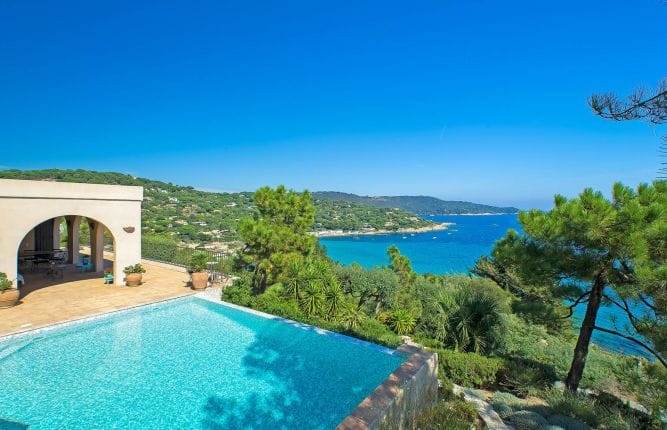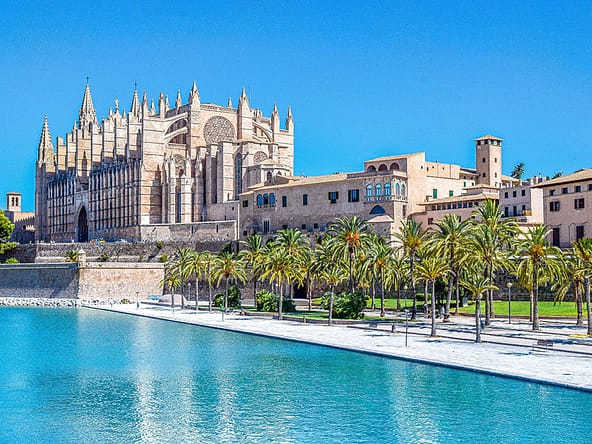Waking up to the Mediterranean as your backyard doesn’t have to be just a fantasy. France’s selection of seaside property spans all styles: dignified apartments in the French Riviera, secluded villas with close proximity to Cannes, pied-à-terres ideal for renting, sprawling estates with private beach access… On top of unbeatable views, luxury property upgrades range from tennis courts and in-house gyms to heated pools and cinema rooms. When buying a coastal property in France, you’re not limited by anything but your vision of a dream life.
Table of Contents
1. Value
Coastal property comes with a high price tag because of the setting’s many benefits: salty air, fresh seafood, sunshine and picturesque landscapes, to name a few. The more you have of those perks – the better the views, the closer you are to the beach – the higher the cost. Many locales also have the opportunity of a jet setting lifestyle, which means being able to attend exclusive parties, dine at gourmet restaurants and shop at designer boutiques. This massive appeal also means there will be great demand for your property should you decide to sell in the future.
2. Lifestyle
Coastal towns range from urban and energetic to rural and quiet. As a rule of thumb, the larger the town, the busier the port, which means a buzzing, cultural environment with accessibility to amenities and public transportation. In contrast, fishing villages and their tight-knit communities have the same seaside allure and beautiful characteristics without being so hectic. Both types of towns have their drawbacks, too. Large towns often have unattractive commercial and industrial areas, and they can be overcrowded even outside of tourist season. Small towns can feel isolated, especially when tourism is slow, and you may not have easy access to certain conveniences. Before you can find the perfect property, you should make a lifestyle wish list. Include the type of backdrop you want, how you plan to travel around, and the resources and comforts you need. Speak with your property agent to discover the coastal towns that offer everything you desire.
3. Tourist Season
Do your research when it comes to tourist season; if possible, visit the area during the high and low seasons. While some coastal towns in France have warm, sunny weather year-round, others experience a more traditional change of seasons, which brings tourists in and out as the weather goes from balmy to cool. Both small and large towns can become congested during tourist season, though some residents like the influx of energy, plus the festivals and events that are arranged to entertain the crowds. Areas with particularly slow off seasons can feel like ghost towns, but this may be enticing to those who like spurts of peaceful downtime.
Yes, high tourism can mean noise and the masses flooding your favorite shops and restaurants, but it also means that the businesses you frequent keep later hours; when tourists leave town, local businesses may start to close earlier. Also, keep in mind that if you opt for a coastal area with slow tourism, it may be challenging to get to and from town, since there hasn’t been a reason to setup several high-speed, main roads. Speak with locals about the flow of tourism – they’ll tell you what to expect.
4. Residents
Interested in who your neighbors will be? Many coastal towns, especially those in the south, where the weather is warm year-round, attract retirees and their families. Also, there are lots of residents who buy second homes on the coast, where they retreat to a few times a year, renting it out or closing it up the rest of the time.
5. Maintenance
Coastal homes have a unique array of maintenance considerations because of how they’re affected by weather and the elements. For example, humid sea air can cause erosion. Before settling on a property, make sure to have it thoroughly inspected by a professional for cracks, humidity, insulation and ventilation.
6. Property Type
Everything from intimate apartments to extensive estates are available along the French coast. Both older and newer homes have their own sets of advantages and disadvantages. Older homes have character, mature gardens and premier locations. They can be difficult to maintain, though, especially if they haven’t been updated in years. Newer homes are low maintenance thanks to modern plumbing, wiring and other facilities, and are often built with the types of materials that can endure the Mediterranean weather. However, they don’t always come with the type of period charm an older home will have. Having specific requirements doesn’t pigeonhole you to one type or the other, though – many older homes have been renovated with modern materials, while newer homes can be designed to look historic.
Knowing how you’ll use the property is also important. If you’re going to be in the property only part of the year and rent it out the rest of the time, an apartment or smaller house may be the easiest type of property to maintain. However, if you’re going to be moving there full-time, you can search for a larger, more permanent home.
7. Buy-to-Let Property
It’s possible to offset purchase and maintenance costs of coastal French property by investing in a buy-to-let home. When you purchase a coastal apartment or villa with the goal of using it only while on holiday, you can rent it out during the rest of the year. In addition to creating an income stream, this is also a great way to test out a location that you may want to live in permanently in the future. Speak with your estate agent about the best locations for rental properties.
When searching for coastal property in France, tap into the knowledge of your estate agents. In addition to having expertise in available properties, HOMEHUNTS also understands the way of life that specific areas offer. We’ll help you find the perfect location, present you with luxury properties for sale and support you through the buying process.




